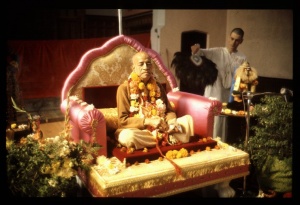CC Madhya 19.74: Difference between revisions
m (1 revision(s)) |
(Vanibot #0054 edit - transform synonyms into clickable links, which search similar occurrences) |
||
| (One intermediate revision by one other user not shown) | |||
| Line 1: | Line 1: | ||
{{ | [[Category:Sri Caitanya-caritamrta - Madhya-lila Chapter 19|C074]] | ||
<div style="float:left">'''[[Sri Caitanya-caritamrta|Śrī Caitanya-caritāmṛta]] - [[CC Madhya|Madhya-līlā]] - [[CC Madhya 19|Chapter 19: Lord Śrī Caitanya Mahāprabhu Instructs Śrīla Rūpa Gosvāmī]]'''</div> | |||
<div style="float:right">[[File:Go-previous.png|link=CC Madhya 19.73|Madhya-līlā 19.73]] '''[[CC Madhya 19.73|Madhya-līlā 19.73]] - [[CC Madhya 19.75|Madhya-līlā 19.75]]''' [[File:Go-next.png|link=CC Madhya 19.75|Madhya-līlā 19.75]]</div> | |||
{{CompareVersions|CC|Madhya 19.74|CC 1975|CC 1996}} | |||
{{RandomImage}} | |||
==== TEXT 74 ==== | ==== TEXT 74 ==== | ||
<div | <div class="verse"> | ||
śuciḥ sad-bhakti-dīptāgni- | :śuciḥ sad-bhakti-dīptāgni- | ||
dagdha-durjāti-kalmaṣaḥ | :dagdha-durjāti-kalmaṣaḥ | ||
śva-pāko ‘pi budhaiḥ ślāghyo | :śva-pāko ‘pi budhaiḥ ślāghyo | ||
na veda-jño ‘pi nāstikaḥ | :na veda-jño ‘pi nāstikaḥ | ||
</div> | </div> | ||
| Line 14: | Line 18: | ||
==== SYNONYMS ==== | ==== SYNONYMS ==== | ||
<div | <div class="synonyms"> | ||
''[//vanipedia.org/wiki/Special:VaniSearch?s=śuciḥ&tab=syno_o&ds=1 śuciḥ]'' — a ''brāhmaṇa'' purified internally and externally; ''[//vanipedia.org/wiki/Special:VaniSearch?s=sat&tab=syno_o&ds=1 sat]-[//vanipedia.org/wiki/Special:VaniSearch?s=bhakti&tab=syno_o&ds=1 bhakti]'' — of devotional service without motives; ''[//vanipedia.org/wiki/Special:VaniSearch?s=dīpta&tab=syno_o&ds=1 dīpta]-[//vanipedia.org/wiki/Special:VaniSearch?s=agni&tab=syno_o&ds=1 agni]'' — by the blazing fire; ''[//vanipedia.org/wiki/Special:VaniSearch?s=dagdha&tab=syno_o&ds=1 dagdha]'' — burnt to ashes; ''[//vanipedia.org/wiki/Special:VaniSearch?s=durjāti&tab=syno_o&ds=1 durjāti]'' — such as birth in a low family; ''[//vanipedia.org/wiki/Special:VaniSearch?s=kalmaṣaḥ&tab=syno_o&ds=1 kalmaṣaḥ]'' — whose sinful reactions; ''[//vanipedia.org/wiki/Special:VaniSearch?s=śva&tab=syno_o&ds=1 śva]-[//vanipedia.org/wiki/Special:VaniSearch?s=pākaḥ&tab=syno_o&ds=1 pākaḥ] [//vanipedia.org/wiki/Special:VaniSearch?s=api&tab=syno_o&ds=1 api]'' — even though born in a family of dog-eaters; ''[//vanipedia.org/wiki/Special:VaniSearch?s=budhaiḥ&tab=syno_o&ds=1 budhaiḥ]'' — by learned scholars; ''[//vanipedia.org/wiki/Special:VaniSearch?s=ślāghyaḥ&tab=syno_o&ds=1 ślāghyaḥ]'' — recognized; ''[//vanipedia.org/wiki/Special:VaniSearch?s=na&tab=syno_o&ds=1 na]'' — not; ''[//vanipedia.org/wiki/Special:VaniSearch?s=veda&tab=syno_o&ds=1 veda]-[//vanipedia.org/wiki/Special:VaniSearch?s=jñaḥ&tab=syno_o&ds=1 jñaḥ] [//vanipedia.org/wiki/Special:VaniSearch?s=api&tab=syno_o&ds=1 api]'' — even though completely conversant in Vedic knowledge; ''[//vanipedia.org/wiki/Special:VaniSearch?s=nāstikaḥ&tab=syno_o&ds=1 nāstikaḥ]'' — an atheist. | |||
</div> | </div> | ||
| Line 21: | Line 25: | ||
==== TRANSLATION ==== | ==== TRANSLATION ==== | ||
<div | <div class="translation"> | ||
Śrī Caitanya Mahāprabhu said, “‘A person who has the pure characteristics of a brāhmaṇa due to devotional service, which is like a blazing fire burning to ashes all the sinful reactions of past lives, is certainly saved from the consequences of sinful acts, such as taking birth in a lower family. Even though he may be born in a family of dog-eaters, he is recognized by learned scholars. But although a person may be a learned scholar in Vedic knowledge, he is not recognized if he is an atheist. | Śrī Caitanya Mahāprabhu said, “‘A person who has the pure characteristics of a brāhmaṇa due to devotional service, which is like a blazing fire burning to ashes all the sinful reactions of past lives, is certainly saved from the consequences of sinful acts, such as taking birth in a lower family. Even though he may be born in a family of dog-eaters, he is recognized by learned scholars. But although a person may be a learned scholar in Vedic knowledge, he is not recognized if he is an atheist. | ||
</div> | </div> | ||
| Line 28: | Line 32: | ||
==== PURPORT ==== | ==== PURPORT ==== | ||
<div | <div class="purport"> | ||
This verse and the next are quoted from the Hari-bhakti-sudhodaya (3.11, 12), a transcendental literature extracted from the Purāṇas. | This verse and the next are quoted from the ''Hari-bhakti-sudhodaya'' (3.11, 12), a transcendental literature extracted from the ''Purāṇas''. | ||
</div> | </div> | ||
__NOTOC__ | |||
<div style="float:right; clear:both;">[[File:Go-previous.png|link=CC Madhya 19.73|Madhya-līlā 19.73]] '''[[CC Madhya 19.73|Madhya-līlā 19.73]] - [[CC Madhya 19.75|Madhya-līlā 19.75]]''' [[File:Go-next.png|link=CC Madhya 19.75|Madhya-līlā 19.75]]</div> | |||
__NOTOC__ | |||
__NOEDITSECTION__ | |||
Latest revision as of 22:31, 19 February 2024

A.C. Bhaktivedanta Swami Prabhupada
TEXT 74
- śuciḥ sad-bhakti-dīptāgni-
- dagdha-durjāti-kalmaṣaḥ
- śva-pāko ‘pi budhaiḥ ślāghyo
- na veda-jño ‘pi nāstikaḥ
SYNONYMS
śuciḥ — a brāhmaṇa purified internally and externally; sat-bhakti — of devotional service without motives; dīpta-agni — by the blazing fire; dagdha — burnt to ashes; durjāti — such as birth in a low family; kalmaṣaḥ — whose sinful reactions; śva-pākaḥ api — even though born in a family of dog-eaters; budhaiḥ — by learned scholars; ślāghyaḥ — recognized; na — not; veda-jñaḥ api — even though completely conversant in Vedic knowledge; nāstikaḥ — an atheist.
TRANSLATION
Śrī Caitanya Mahāprabhu said, “‘A person who has the pure characteristics of a brāhmaṇa due to devotional service, which is like a blazing fire burning to ashes all the sinful reactions of past lives, is certainly saved from the consequences of sinful acts, such as taking birth in a lower family. Even though he may be born in a family of dog-eaters, he is recognized by learned scholars. But although a person may be a learned scholar in Vedic knowledge, he is not recognized if he is an atheist.
PURPORT
This verse and the next are quoted from the Hari-bhakti-sudhodaya (3.11, 12), a transcendental literature extracted from the Purāṇas.